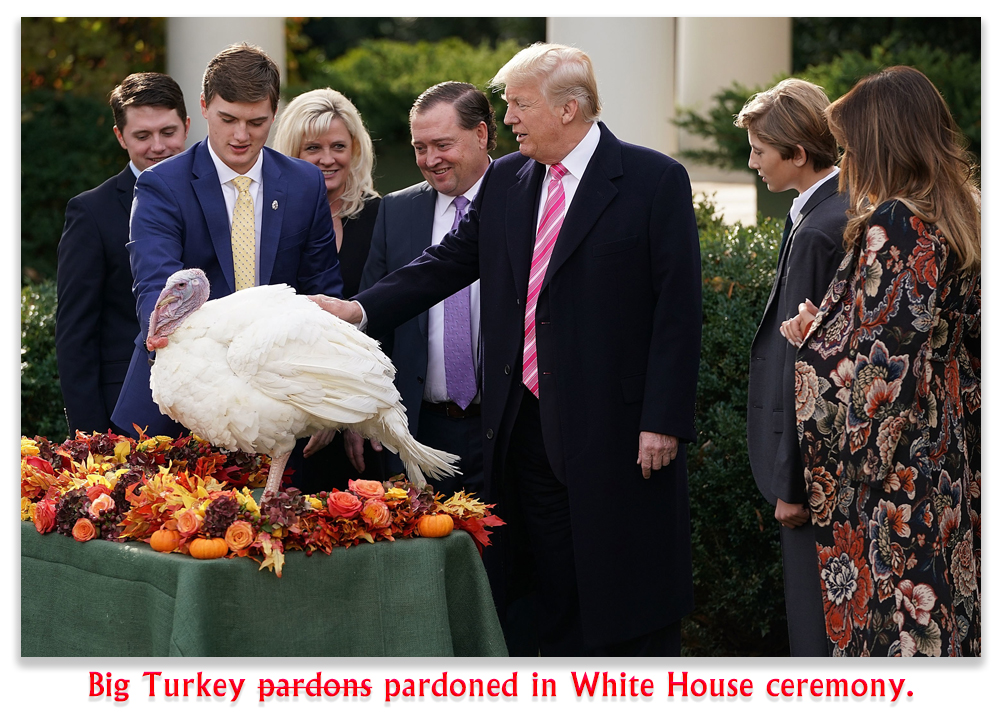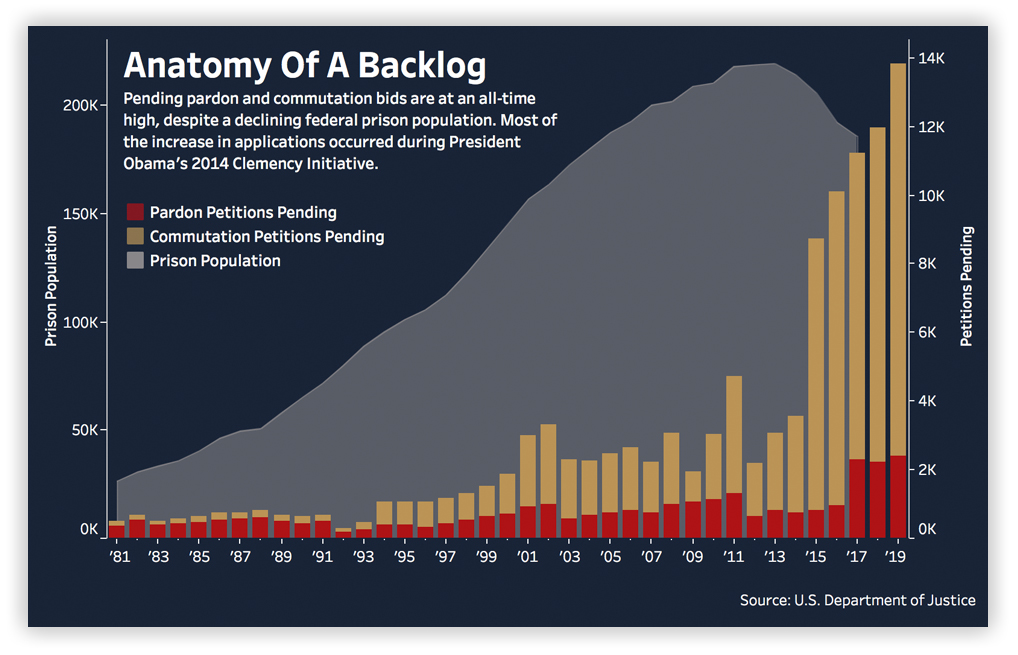We post news and comment on federal criminal justice issues, focused primarily on trial and post-conviction matters, legislative initiatives, and sentencing issues.

THINGS ARE GETTING WEIRD
 Secret commutations. A phony White House pardon website. Capitol Hill rioters complaining on TV the president sent them to the insurrection, so he owes them a pardon. A promise of hundreds of clemencies. A president wonder-ing whether he can pardon himself.
Secret commutations. A phony White House pardon website. Capitol Hill rioters complaining on TV the president sent them to the insurrection, so he owes them a pardon. A promise of hundreds of clemencies. A president wonder-ing whether he can pardon himself.
For weeks, federal inmates have hoped President Trump would grant clemency to thousands of them on his way out the door. But if things looked like they were going sideways before Jan 6, they have gotten downright screwy since then.
As of this morning, the Washington Post reported “Trump is preparing to pardon or commute the sentences of more than 100 people in his final hours in office, decisions that are expected to be announced Monday or Tuesday, according to two people familiar with the discussions, who spoke on the condition of anonymity to describe the plans.”
The Post said Trump “has been besieged by lobbyists and lawyers for well-heeled clients who are seeking to have their criminal convictions wiped from their records, as well as by advocates for criminal justice reform, who argue that their clients were wrongly convicted or were given unfair sentences and deserve to be freed from prison.” Trump’s clemency binge has been delayed by what the Post called increasing dysfunction stemming from the Capitol riot and impeachment, but he reportedly spent part of the weekend finalizing his list.
The President has always made a big deal of his clemencies, but last Tuesday, he quietly commuted the sentence of Fred Davis Clark, whose Ponzi theft of over $171 million got him a 480-month federal sentence two years ago. Fred’s docket said the 60-year old defendant had an out date beyond 2050, but the BOP released him last Tuesday. The White House has released no official statement on the clemency.
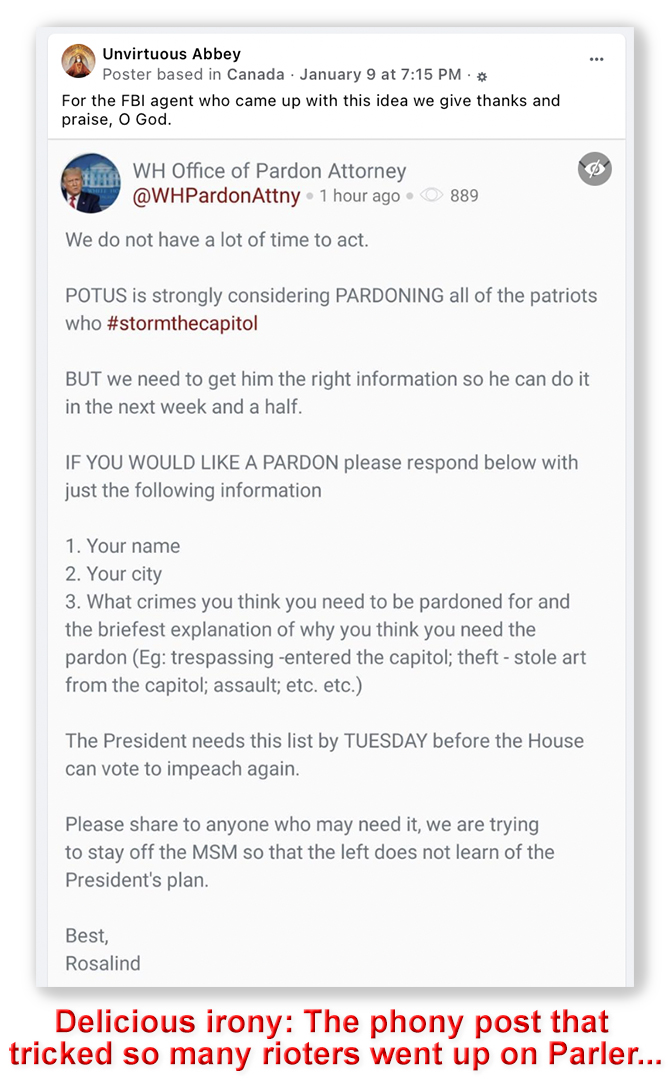 The White House did, however, release a statement declaring a pardon notice circulating on the right-wing website Parler to be fake. The phony post, which claimed to be from the Office of Pardon Attorney, said “POTUS is seriously considering PARDONING all of the patriots in the next week and a half. If you would like a pardon, please respond below.” It then asks for the rioter’s name, city and even “what crimes you think you need to be pardoned for,” asking for them by “Tuesday” so the President can get to work on them. (Some might suggest that the very notion of the President “working” should have been the tipoff that the post was a fraud).
The White House did, however, release a statement declaring a pardon notice circulating on the right-wing website Parler to be fake. The phony post, which claimed to be from the Office of Pardon Attorney, said “POTUS is seriously considering PARDONING all of the patriots in the next week and a half. If you would like a pardon, please respond below.” It then asks for the rioter’s name, city and even “what crimes you think you need to be pardoned for,” asking for them by “Tuesday” so the President can get to work on them. (Some might suggest that the very notion of the President “working” should have been the tipoff that the post was a fraud).
Some of the people who thought that vandalizing the Capitol was great fun are apparently have second thoughts now that their selfies and tweets are leading to criminal charges. Jenna Ryan, a Texas real estate broker who was arrested for joining the attack on the Capitol, has pleaded with Trump to pardon her. After surrendering to the FBI on Friday, Ryan said: “We all deserve a pardon. I’m facing a prison sentence. I think I do not deserve that.” Ryan said she had been “displaying my patriotism,” adding, “I listen to my president who told me to go to the Capitol.”
The Dept of Justice issued a statement last weekend that “the information circulating on social media claiming to be from Acting Pardon Attorney Rosalind Sargent-Burns is inauthentic and should not be taken seriously.”
In private, the president has continued to pursue which pardons he can grant in his final days in office, calling advisers to ask for suggestions. The White House is expected to release dozens of pardons in the days before he leaves office, aides say. Aides say they don’t know if some of the most controversial pardons—including for Rudy Giuliani, for the president’s children, and for the president himself—will be among them.
The New York Times reported last night that “a lucrative market for pardons is coming to a head, with some of his allies collecting fees from wealthy felons or their associates to push the White House for clemency, according to documents and interviews with more than three dozen lobbyists and lawyers.” People reported to be selling services include former AUSA Brett Tolman, Trump’s personal lawyer John M. Dowd, and Guliani.
 Politico reported last Friday that former White House advisor Steve Bannon – facing a federal fraud trial in May – is on the pardon list. Politico’s White House source said “two additional batches of pardons are expected — one on Friday night and one Wednesday morning before President-elect Joe Biden is sworn into office.” Of course, Friday has come and gone, and the first of the promised clemency lists did not happen. Last Monday, ABC reported that after some of Trump’s lawyers told him that if he pardons himself, he could be more vulnerable to civil lawsuits. “The president is angry,” ABC reporter Jonathan Karl said. “He has not taken that well, and I am told that he is now saying that he doesn’t want to see pardons for anybody. So the attitude seems to be: ‘If I can’t get a pardon, then nobody else should get one, either.'”
Politico reported last Friday that former White House advisor Steve Bannon – facing a federal fraud trial in May – is on the pardon list. Politico’s White House source said “two additional batches of pardons are expected — one on Friday night and one Wednesday morning before President-elect Joe Biden is sworn into office.” Of course, Friday has come and gone, and the first of the promised clemency lists did not happen. Last Monday, ABC reported that after some of Trump’s lawyers told him that if he pardons himself, he could be more vulnerable to civil lawsuits. “The president is angry,” ABC reporter Jonathan Karl said. “He has not taken that well, and I am told that he is now saying that he doesn’t want to see pardons for anybody. So the attitude seems to be: ‘If I can’t get a pardon, then nobody else should get one, either.'”
Washington Post, Trump prepares to offer clemency to more than 100 people in his final hours in office (January 18, 2021)
Law360.com, Trump Commutes Ex-Cay Clubs CEO’s Ponzi Sentence (January 14, 2021)
DOJ, Statement on Misinformation on Social Media Regarding the Office of the Pardon Attorney (January 9, 2021)
The Guardian, ‘I’m facing a prison sentence’: US Capitol rioters plead with Trump for pardons (January 16, 2021)
New York Times, Prospect of Pardons in Final Days Fuels Market to Buy Access to Trump (January 17, 2021)
Wall Street Journal, Trump Spends Final Days Focused on GOP Defectors, Senate Defense (January 16, 2021)
Politico, Trump weighing a pardon for Steve Bannon (January 15, 2021)
The Week, Trump is reportedly so angry aides are warning him against a self-pardon, he’s put all pardons ‘on hold’ (January 12, 2021)
– Thomas L. Root


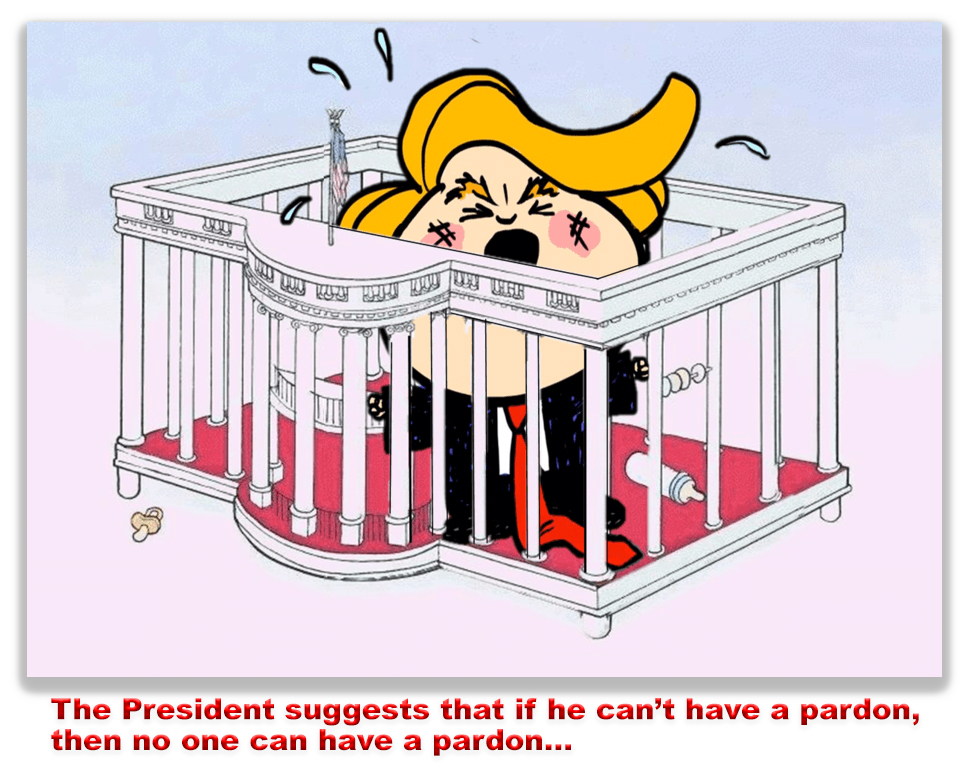





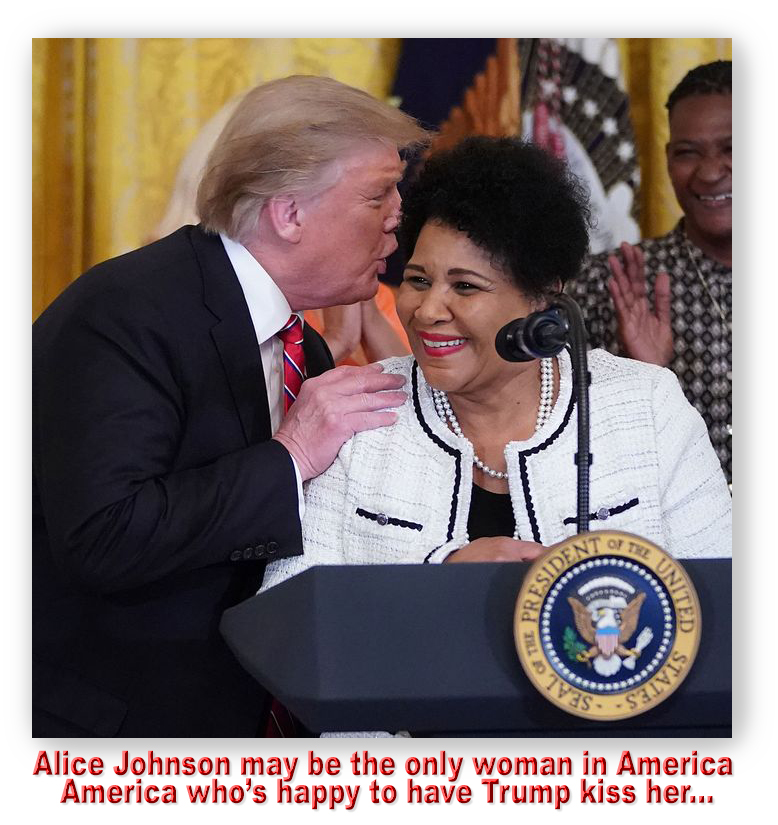









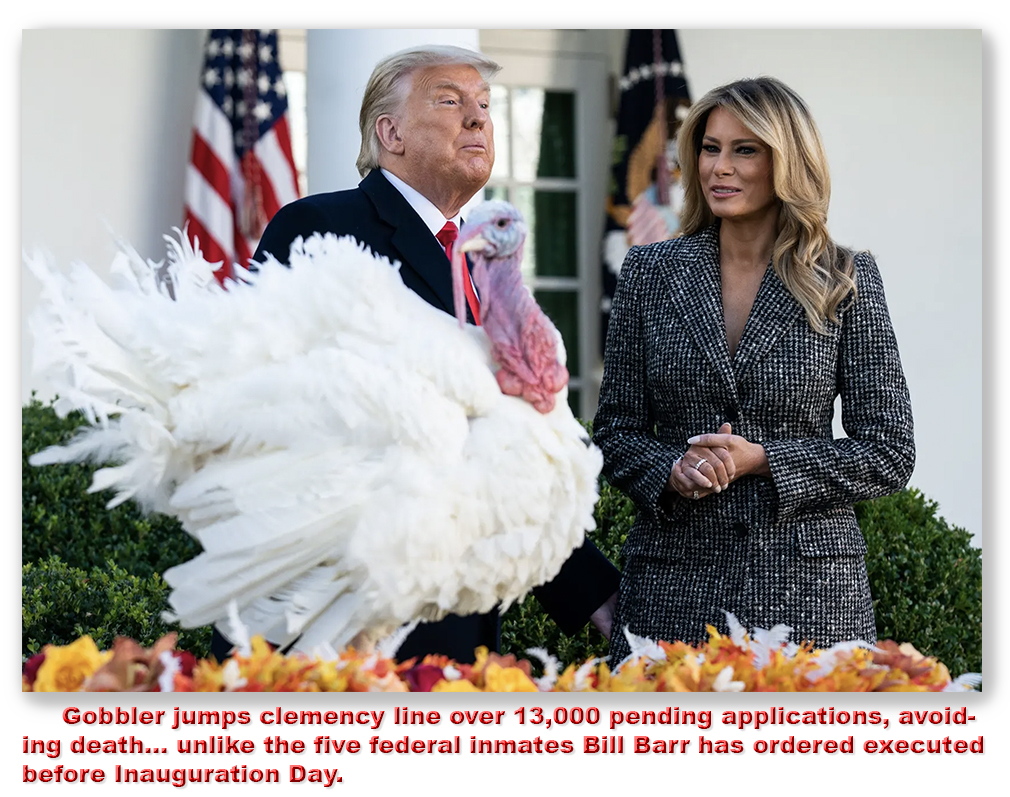


 Ohio State law professor Doug Berman lamented in his Sentencing Law and Policy blog last week that “I am not really surprised that Prez Trump has entirely failed to deliver on his promise back in March to look at freeing elderly “totally nonviolent” offenders from federal prisons amid the pandemic. But I figure now is as good a time as any to highlight again that Prez Trump could and should, via just a stroke of a pen, bring clemency relief to the many, many federal prisoners who, like Roger Stone, are older, medically vulnerable and present no clear risk to public safety.”
Ohio State law professor Doug Berman lamented in his Sentencing Law and Policy blog last week that “I am not really surprised that Prez Trump has entirely failed to deliver on his promise back in March to look at freeing elderly “totally nonviolent” offenders from federal prisons amid the pandemic. But I figure now is as good a time as any to highlight again that Prez Trump could and should, via just a stroke of a pen, bring clemency relief to the many, many federal prisoners who, like Roger Stone, are older, medically vulnerable and present no clear risk to public safety.”